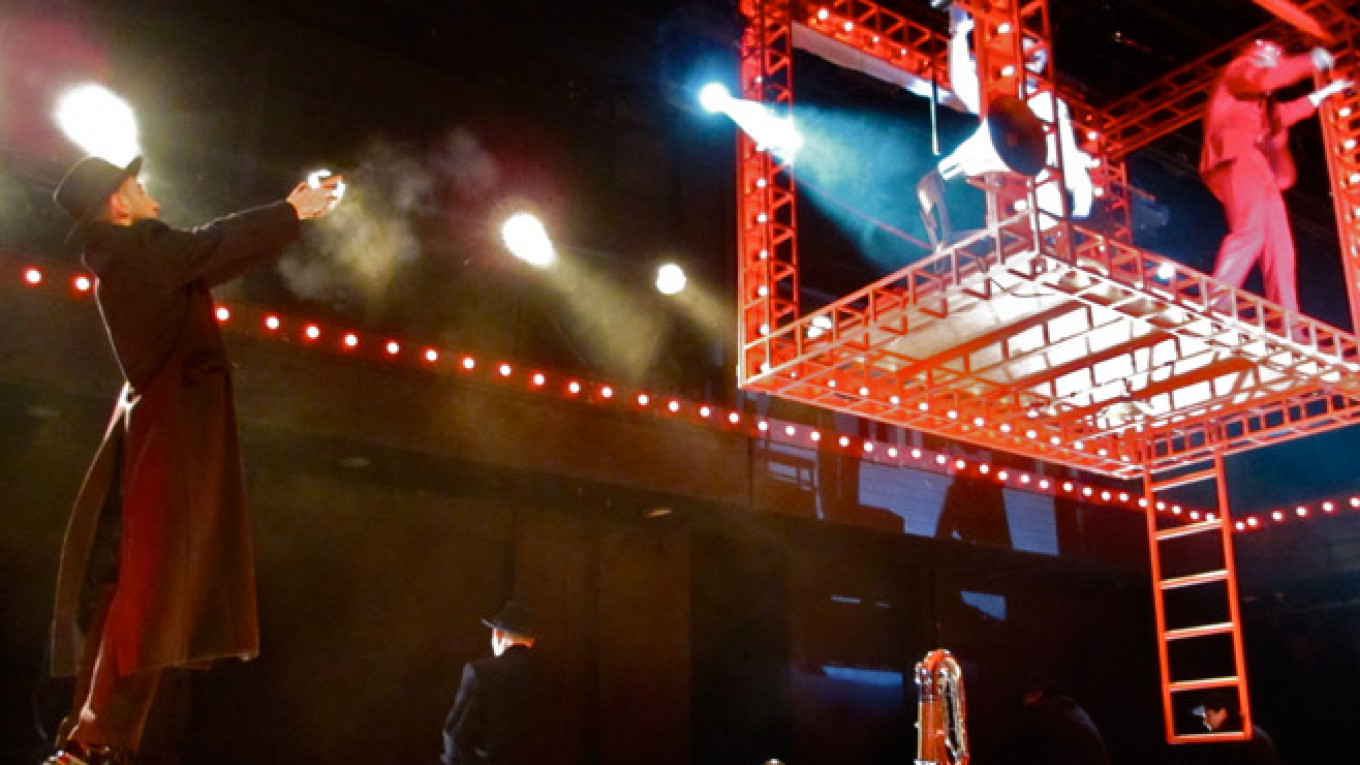Cabarets and war are more similar than you might think. One raises serious issues by way of mirth, the other is just deadly serious.
So perhaps it's no surprise that a show like the Moscow Art Theater's "19.14: A Cabaret" would arise. What does grab attention is how well it is done.
"19.14," the title of which only barely hides a reference to the year 1914 and the beginning of World War I, is created with young energy and talent. This marks Alexander Molochnikov's directing debut, and he works well with a cast of mostly young actors. Youth is important here — it brings audacity, confidence, mischief and an aching sense of innocence in surfeit.
Artyom Volobuyev, outfitted in a blood-red costume designed by Maria Danilova, is the master of ceremonies. He oversees comic and tragic skits that don't so much tell the history of World War I as seek the essence of this and, probably, every armed conflict that has ever taken place.
It begins with a barrage of borderline insulting jokes that take on Jews, bourgeois society, obscenity and censorship. Some are so offensive that almost none go over well with the audience. Surely that is Molochnikov's plan. He rocks folks back on their heels before they even know what hit them.
Volobuyev is the perfect man for the job. Sly, witty, quick, seemingly crass within reason, he charges ahead with his job. He has a show to emcee and he'll get that done, good audience or bad.
Jabs are taken at Russia's new censorship law throughout the evening, with Volobuyev grabbing his mouth as his eyes bug out every time he almost cuts loose with a forbidden word.
I bring this up for good reason. This is virtually the show's sole overt reference to the present. It would have been easy, for instance, to find echoes with a war currently being fought in a territory southwest of Russia. But there is none of that here. Teasing the audience that no one remembers anything about World War I, himself included, the emcee introduces the evening's first skit — a farcical demonstration of the clumsy assassination of Austrian Archduke Ferdinand in Serbia.
From there, however, "19.14" veers from a historical perspective into a deeply human view. Constantly satirizing everything that happens, Volobuyev clears the stage for scenes of individual, quite personal, confrontations.
In one scene a German father (Yevgeny Syty) confronts his son Hans (Pavel Vorozhtsov) over the latter's desire to avoid the war. "This is not a proper war," the young man repeats over and over as his father coerces him to go to battle. In another, a French family of fine manners gathers to dine as war prepares to blow their world apart.
Perhaps the most powerful and moving skit involves a famous German scholar (Yury Kravets) who falls into conversation with a knowledgeable French student (Rostislav Lavrentyev) over the short distance separating their trenches before a battle. Their initially hostile exchange turns to one of respect and interest as the student realizes this is the professor whose books he has read and admired.
The warm chat is brought to an abrupt end, however, by a trigger-happy French soldier who knows that war does not brook such sentimentality.
Nikolai Simonov's set design incorporates a kind of red carriage of the gods that rides back and forth above the action while, on the stage, boards may be removed to reveal trenches or graves.
The dialogues for scenes were written by Alexander Arkhipov and Vsevolod Benigsen, while the poetry that is incorporated was written by Dmitry Bykov. But it's not words in "19.14" that have such a strong effect, it is rather the situations people find themselves in.
Consider what happens when the shell-shocked Jean (Artyom Bystrov) comes home to his family for the Christmas armistice. He is as sickened by the superficial nonsense that his wife (Sofya Raizman) spouts at the dinner table, as she is appalled by his stories of how to split a man open with a shovel.
What has happened since their last genteel meal took place? War intruded.
"19.14" is not necessarily the funniest cabaret you'll ever see. But it packs a truly admirable punch.
"19.14: A Cabaret" plays Mon. at 7 p.m. on the small stage of the Moscow Art Theater, located at 3 Kamergersky Pereulok. Metro Okhotny Ryad. Tel. 495-629-8760. Running time: 1 hour, 50 minutes.
Contact the author at artsreporter@imedia.ru
A Message from The Moscow Times:
Dear readers,
We are facing unprecedented challenges. Russia's Prosecutor General's Office has designated The Moscow Times as an "undesirable" organization, criminalizing our work and putting our staff at risk of prosecution. This follows our earlier unjust labeling as a "foreign agent."
These actions are direct attempts to silence independent journalism in Russia. The authorities claim our work "discredits the decisions of the Russian leadership." We see things differently: we strive to provide accurate, unbiased reporting on Russia.
We, the journalists of The Moscow Times, refuse to be silenced. But to continue our work, we need your help.
Your support, no matter how small, makes a world of difference. If you can, please support us monthly starting from just $2. It's quick to set up, and every contribution makes a significant impact.
By supporting The Moscow Times, you're defending open, independent journalism in the face of repression. Thank you for standing with us.
Remind me later.







